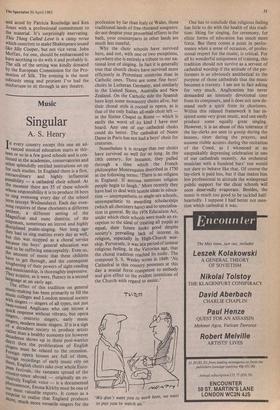Music
Singular
A. S. Henry
In every country except this one an ad- vanced musical education starts at thir- teen or so in a few good schools and is con- tinued in the academies, conservatories and other splendidly entitled institutions set up for such studies. In England there is a first, extraordinary and highly influential Possibility — a cathedral choir school. At the moment there are 35 of these schools whose responsibility it is to produce 16 boys to sing evensong every day of the school term (except Wednesdays). Each day even- song requires of these choristers a different anthem, a different setting of the Magnificat and nunc dimittis; ofthe responses, sometimes an introit and highly disciplined psalm-singing. Not long ago they had to sing mattins every day as well, but this was stopped as a choral service because the boys' general education was said to be suffering unacceptably. Even so, the amount of music that these children have to get through, and the consequent toughening of their powers of sight-reading and musicianship, is thoroughly impressive. language acquire, as it were, fluency in a second Aanguage at an early age. The effect of this tradition on general Music-making has been primarily to fill the Music colleges and London musical society with singers — singers of all types, not just twee-voiced Anglicans who can intone a quick response without vibrato, but opera singers, oratorio singers, early music ,,Tgers, modern music singers. If it is a sign "I a decadent society to produce artists rather than a healthy economy (or however decadence shows up in these post-warrior days) then the proliferation of English frngers must be related to the recession. °reign opera houses are full of them, ,,_°1-eign recordings of early music rely on eme English choirs take over whole Euro- pean festivals, the rampant spread of the counter-tenor abroad — originally an ex- clusively English voice — is a documented '...'enomenon, Emma Kirkby must be one of '`..44 most valuable exports. It comes as a sue to realise that England produces mare, much more versatile singers for the
profession by far than Italy or Wales, those traditional lands of free-throated songsters: do not despise your proverbial efforts in the bath, your counterparts in other lands are much less tuneful.
Why the choir schools have survived here, and not, with one or two exceptions, anywhere else is entirely a tribute to our na- tional love of singing. In fact it is generally true that church choirs have survived more efficiently in Protestant countries than in Catholic ones. There are some fine boys' choirs in Lutheran Germany, and similarly in the United States, Australia and New Zealand. On the Catholic side the Spanish have kept some monastery choirs alive, but their choral style is rooted in opera, as is that of the only Italian all-male choir left in the Sistine Chapel in Rome — which is easily the worst of its kind I have ever heard. Any one of our cathedral choirs could do better. The cathedral of Notre Dame in Paris has not had a boys' choir for centuries.
Nonetheless it is strange that our choirs have survived so well for so long. In the 18th century, for instance, they pulled through a time which the French philosopher Montesquieu described in 1730 in the following terms: `There is no religion in England. If anyone mentions religion people begin to laugh.' More recently they have had to deal with hostile ideas in educa- tion — unsympathetic to single-sex schools, unsympathetic to awarding scholarships (which all choristers have) and to specialisa- tion in general. By the 1976 Education Act, under which choir schools were made an ex- ception to the ideal of treating all pupils as equal, their future looks good despite society's prevailing lack of interest in. religion, especially in High-Church wor- ship. Perversely, it was inla period of intense religious feeling, in the Victorian age, that the choral tradition reached its nadir. The composer S. S. Wesley wrote in 1849: 'No Cathedral in this country possesses at this day a musial force competent to embody and give effect to the evident intentions of the Church with regard to music.'
`We don't want you to work here, we want to pay you to watch us.' One has to conclude that religious feeling has little to do with the health of this tradi- tion: liking for singing, for ceremony, for elitist forms of education has much more force. But there comes a point in perfor- mance when a sense of occasion, of profes- sional respect for the music, is critical. For all its wonderful uniqueness of training, this tradition should not survive as a servant of cathedral worship if the attitude of the per- formers is so obviously antithetical to the purpose of those cathedrals that the music becomes a travesty. I am not in fact asking for very much. Anglicanism has never demanded an intensely devotional tone from its composers, and it does not now de- mand such a spirit from its choristers. Within this relaxed framework it has in- spired some very great music, and can easily produce some equally great singing. However, it is an abuse of this tolerance if the lay-clerks are seen to gossip during the lessons, titter during the prayers, and assume risible accents during the recitation of the Creed, as I witnessed at an unspeakably depressing celebration in one of our cathedrals recently. An orchestral musician with a hundred bars' rest would not dare to behave like that. Of course the lay-clerk is paid less, but if that makes him less professional in attitude the widespread public support for the choir schools will soon deservedly evaporate. Besides, the music is much too good to be tackled half- heartedly. I suppose I had better not men- tion which cathedral it was,










































 Previous page
Previous page